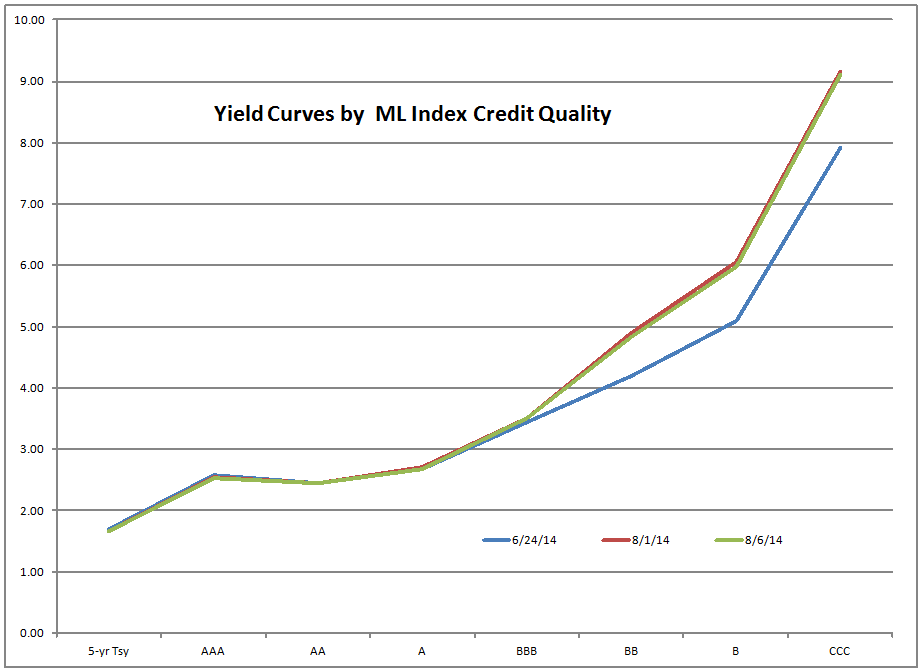Quoting the beginning of a recent article at Bloomberg.com:
As junk bonds plunge in value, many investors are wondering why.
There’s no obvious explanation for the 1.5 percent decline in U.S. high-yield securities in the past month, or the $9.9 billion of cash pulled from mutual funds that buy the debt. The most likely reason is that investors are increasingly uncomfortable hanging onto bonds that are expensive by historical measures.
Chalk this one up to a collective bout of angst that looks quite different from the 3.2 percent drop in speculative-grade bonds in May and June of last year. That rout was triggered by the prospect of less Federal Reserve stimulus and, while a withdrawal of easy-money policies still weighs on investors’ minds, that’s not the full story now.
On June 24th, the junk-bond markets were fairly tightly bid, and volume in the main high yield ETFs [(ARCA:JNK) & (ARCA:HYG)] were moderate. By August 1st, that bid had seemingly disappeared, but volume in the main high-yield ETFs were high. Many running for the exits. Things have calmed down since then, at least it seems that way. Have a look at this set of credit yield curves:

Source: FRED
Credit quality goes down as you go from left to right on my chart. The lower rated the bonds, the more they fell, which was the opposite of slower moving but long-lasting bull phase. Let’s look at what the losses/gains were like in percentage terms:

The return calculations are approximations. These are indicative, not exact. The losses on high-yield debt haven’t been horribly large over this period — around 3% give or take, and the ETFs surprisingly did a little better. No panic in investment grade bonds, and the losses of the stock market have been minor over that time, leaving aside the fact that the market rallied for a few more weeks after high yield began to slide.
But here’s an odd bit — take a look at the last column in my table. That last column is the iShares Select Dividend ETF (ARCA:DVY), a very popular place for getting alternative yield. It yields about 3.1% now — a little less than you can get on BBB bonds, but maybe the dividend will grow. (It usually does.)
When you have many different parties going into the markets seeking income, not caring where they get it from, and a shock hits one part of the market, the effect flows to other areas If all of a sudden yields on junk bonds look cheaper, the yield trade-offs of buying junk and selling dividend paying common stocks looks attractive.
Now there are few permanent rules for yield relationships — even in corporate debt on its own. We can calculate average spread differences, sure, but there is a LOT of variation around those means (which may even bear no resemblance to future means). If it is that difficult asking what the right spread tradeoffs are with bonds different qualities, then how would we ever come up with the right tradoffs for common stocks, preferred stocks, REITs, MLPs, bonds of varying qualities, etc?
The best we can do is something like GMO does, and go to each asset class and try to estimate the free cash flow yield of each asset class over the next full market cycle (5-10 years) given the current prices being paid. The higher the price paid, the lower future returns will be, and vice-versa. Assume that valuations will normalize over the forecast horizon, and don’t just look at valuations using earnings. Try book, free cash flow and sales as well. Results will vary.
So remember, The Investments Matter More than their Form. Also remember, Ignore Yield. Focus on what is building value for you in every investment. I like to own stocks where earnings quality is high, valuations are low, and free cash flow gets put to good use. Do I always get that? No. But if I get it right enough of the time, then returns will be good enough.
Back to the beginning, though. Is this move in the junk bond market a hiccup, or the start of something big? I’m open to other opinions, but for it to be something big, you have to have a lot of things that look misfinanced. Where are there economic entities with short-term debt financing long term assets that look overvalued? Where have debts grown the most? I can’t identify a class like that unless we try student loans, or government debts. Corporate debt has grown, but doesn’t seem unreasonable now.
So, with high yield, I lean toward the hiccup. But even at current yields, it is not cheap. Speculators may play; I will stay away.
